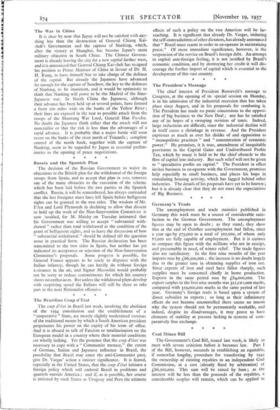The Brazilian Coup d'Etat The coup d'etat in Brazil last
week, involving the abolition of the 1934 constitution and the establishment of a " corporative " State, are merely slightly modernised versions of the traditional means by which a South American president perpetuates his power on the expiry of his term of office. And it is absurd to talk of Fascism or totalitarianism on the European model in a country where their material conditions are wholly lacking. Yet the pretence that the coup d'etat was necessary to cope with a " Communist menace," the extent of German, Italian and Japanese influence in Brazil, the possibility that Brazil may enter the anti-Communist pact, give Dr. Vargas' action a sinister significance. It is feared, especially in the United States, that the coup d'etat initiates a foreign policy which will embroil Brazil in problems and quarrels outside America ; and if, as is possible, her course is imitated by such States as Uruguay and Peru the ultimate effects of such a policy on the two Americas will be far- reaching. It is significant that already Dr. Vargas, imitating the self-contradictions of other dictators, has already announced that " Brazil must rearm in order to co-operate in maintaining peace." Of more immediate significance, however, is the suspension of the service on Brazil's foreign debt. An attempt to exploit anti-foreign feeling, it is not justified by Brazil's economic condition, and by destroying her credit it will .dis- courage the further import of capital which is essential to the development of this vast country.
















































































































 Previous page
Previous page